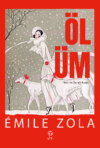Kitabı oku: «L'Assommoir», sayfa 7
Monsieur Madinier ended by going down with the landlord. One could hear them arguing below. Then, when half an hour had gone by the cardboard box manufacturer returned; he had settled the matter by giving three francs. But the party continued annoyed and exasperated, constantly returning to the question of the extras. And the uproar increased from an act of vigor on Madame Boche's part. She had kept an eye on Boche, and at length detected him squeezing Madame Lerat round the waist in a corner. Then, with all her strength, she flung a water pitcher, which smashed against the wall.
"One can easily see that your husband's a tailor, madame," said the tall widow, with a curl of the lip, full of a double meaning. "He's a petticoat specialist, even though I gave him some pretty hard kicks under the table."
The harmony of the evening was altogether upset. Everyone became more and more ill-tempered. Monsieur Madinier suggested some singing, but Bibi-the-Smoker, who had a fine voice, had disappeared some time before; and Mademoiselle Remanjou, who was leaning out of the window, caught sight of him under the acacias, swinging round a big girl who was bare-headed. The cornet-a-piston and two fiddles were playing "Le Marchand de Moutarde." The party now began to break up. My-Boots and the Gaudrons went down to the dance with Boche sneaking along after them. The twirling couples could be seen from the windows. The night was still as though exhausted from the heat of the day. A serious conversation started between Lorilleux and Monsieur Madinier. The ladies examined their dresses carefully to see if they had been stained.
Madame Lerat's fringe looked as though it had been dipped in the coffee. Madame Fauconnier's chintz dress was spotted with gravy. Mother Coupeau's green shawl, fallen from off a chair, was discovered in a corner, rolled up and trodden upon. But it was Madame Lorilleux especially who became more ill-tempered still. She had a stain on the back of her dress; it was useless for the others to declare that she had not – she felt it. And, by twisting herself about in front of a looking-glass, she ended by catching a glimpse of it.
"What did I say?" cried she. "It's gravy from the fowl. The waiter shall pay for the dress. I will bring an action against him. Ah! this is a fit ending to such a day. I should have done better to have stayed in bed. To begin with, I'm off. I've had enough of their wretched wedding!"
And she left the room in a rage, causing the staircase to shake beneath her heavy footsteps. Lorilleux ran after her. But all she would consent to was that she would wait five minutes on the pavement outside, if he wanted them to go off together. She ought to have left directly after the storm, as she wished to do. She would make Coupeau sorry for that day. Coupeau was dismayed when he heard how angry she was. Gervaise agreed to leave at once to avoid embarrassing him any more.
There was a flurry of quick good-night kisses. Monsieur Madinier was to escort mother Coupeau home. Madame Boche would take Claude and Etienne with her for the bridal night. The children were sound asleep on chairs, stuffed full from the dinner. Just as the bridal couple and Lorilleux were about to go out the door, a quarrel broke out near the dance floor between their group and another group. Boche and My-Boots were kissing a lady and wouldn't give her up to her escorts, two soldiers.
It was scarcely eleven o'clock. On the Boulevard de la Chapelle, and in the entire neighborhood of the Goutte-d'Or, the fortnight's pay, which fell due on that Saturday, produced an enormous drunken uproar. Madame Lorilleux was waiting beneath a gas-lamp about twenty paces from the Silver Windmill. She took her husband's arm, and walked on in front without looking round, at such a rate, that Gervaise and Coupeau got quite out of breath in trying to keep up with them. Now and again they stepped off the pavement to leave room for some drunkard who had fallen there. Lorilleux looked back, endeavoring to make things pleasant.
"We will see you as far as your door," said he.
But Madame Lorilleux, raising her voice, thought it a funny thing to spend one's wedding night in such a filthy hole as the Hotel Boncoeur. Ought they not to have put their marriage off, and have saved a few sous to buy some furniture, so as to have had a home of their own on the first night? Ah! they would be comfortable, right up under the roof, packed into a little closet, at ten francs a month, where there was not even the slightest air.
"I've given notice, we're not going to use the room up at the top of the house," timidly interposed Coupeau. "We are keeping Gervaise's room, which is larger."
Madame Lorilleux forgot herself. She turned abruptly round.
"That's worse than all!" cried she. "You're going to sleep in Clump-clump's room."
Gervaise became quite pale. This nickname, which she received full in the face for the first time, fell on her like a blow. And she fully understood it, too, her sister-in-law's exclamation: the Clump-clump's room was the room in which she had lived for a month with Lantier, where the shreds of her past life still hung about. Coupeau did not understand this, but merely felt hurt at the harsh nickname.
"You do wrong to christen others," he replied angrily. "You don't know perhaps, that in the neighborhood they call you Cow's-Tail, because of your hair. There, that doesn't please you, does it? Why should we not keep the room on the first floor? To-night the children won't sleep there, and we shall be very comfortable."
Madame Lorilleux added nothing further, but retired into her dignity, horribly annoyed at being called Cow's-Tail. To cheer up Gervaise, Coupeau squeezed her arm softly. He even succeeded in making her smile by whispering into her ear that they were setting up housekeeping with the grand sum of seven sous, three big two-sou pieces and one little sou, which he jingled in his pocket.
When they reached the Hotel Boncoeur, the two couples wished each other good-night, with an angry air; and as Coupeau pushed the two women into each other's arms, calling them a couple of ninnies, a drunken fellow, who seemed to want to go to the right, suddenly slipped to the left and came tumbling between them.
"Why, it's old Bazouge!" said Lorilleux. "He's had his fill to-day."
Gervaise, frightened, squeezed up against the door of the hotel. Old Bazouge, an undertaker's helper of some fifty years of age, had his black trousers all stained with mud, his black cape hooked on to his shoulder, and his black feather hat knocked in by some tumble he had taken.
"Don't be afraid, he's harmless," continued Lorilleux. "He's a neighbor of ours – the third room in the passage before us. He would find himself in a nice mess if his people were to see him like this!"
Old Bazouge, however, felt offended at the young woman's evident terror.
"Well, what!" hiccoughed he, "we ain't going to eat any one. I'm as good as another any day, my little woman. No doubt I've had a drop! When work's plentiful one must grease the wheels. It's not you, nor your friends, who would have carried down the stiff 'un of forty-seven stone whom I and a pal brought from the fourth floor to the pavement, and without smashing him too. I like jolly people."
But Gervaise retreated further into the doorway, seized with a longing to cry, which spoilt her day of sober-minded joy. She no longer thought of kissing her sister-in-law, she implored Coupeau to get rid of the drunkard. Then Bazouge, as he stumbled about, made a gesture of philosophical disdain.
"That won't prevent you passing though our hands, my little woman. You'll perhaps be glad to do so, one of these days. Yes, I know some women who'd be much obliged if we did carry them off."
And, as Lorilleux led him away, he turned around, and stuttered out a last sentence, between two hiccoughs.
"When you're dead – listen to this – when you're dead, it's for a long, long time."
CHAPTER IV
Then followed four years of hard work. In the neighborhood, Gervaise and Coupeau had the reputation of being a happy couple, living in retirement without quarrels, and taking a short walk regularly every Sunday in the direction of St. Ouen. The wife worked twelve hours a day at Madame Fauconnier's, and still found means to keep their lodging as clean and bright as a new coined sou and to prepare the meals for all her little family, morning and evening. The husband never got drunk, brought his wages home every fortnight, and smoked a pipe at his window in the evening, to get a breath of fresh air before going to bed. They were frequently alluded to on account of their nice, pleasant ways; and as between them they earned close upon nine francs a day, it was reckoned that they were able to put by a good deal of money.
However, during their first months together they had to struggle hard to get by. Their wedding had left them owing two hundred francs. Also, they detested the Hotel Boncoeur as they didn't like the other occupants. Their dream was to have a home of their own with their own furniture. They were always figuring how much they would need and decided three hundred and fifty francs at least, in order to be able to buy little items that came up later.
They were in despair at ever being able to collect such a large sum when a lucky chance came their way. An old gentleman at Plassans offered to take the older boy, Claude, and send him to an academy down there. The old man, who loved art, had previously been much impressed by Claude's sketches. Claude had already begun to cost them quite a bit. Now, with only Etienne to support, they were able to accumulate the money in a little over seven months. One day they were finally able to buy their own furniture from a second-hand dealer on Rue Belhomme. Their hearts filled with happiness, they celebrated by walking home along the exterior Boulevards.
They had purchased a bed, a night table, a chest of drawers with a marble top, a wardrobe, a round table covered with oilcloth, and six chairs. All were of dark mahogany. They also bought blankets, linen, and kitchen utensils that were scarcely used. It meant settling down and giving themselves a status in life as property owners, as persons to be respected.
For two months past they had been busy seeking some new apartments. At first they wanted above everything to hire these in the big house of the Rue de la Goutte-d'Or. But there was not a single room to let there; so that they had to relinquish their old dream. To tell the truth, Gervaise was rather glad in her heart; the neighborhood of the Lorilleux almost door to door, frightened her immensely. Then, they looked about elsewhere. Coupeau, very properly did not wish to be far from Madame Fauconnier's so that Gervaise could easily run home at any hour of the day. And at length they met with exactly what suited them, a large room with a small closet and a kitchen, in the Rue Neuve de la Goutte-d'Or, almost opposite the laundress's. This was in a small two-story building with a very steep staircase. There were two apartments on the second floor, one to the left, the other to the right, The ground floor was occupied by a man who rented out carriages, which filled the sheds in the large stable yard by the street.
Gervaise was delighted with this as it made her feel she was back in a country town. With no close neighbors there would be no gossip to worry about in this little corner. It reminded her of a small lane outside the ramparts of Plassans. She could even see her own window while ironing at the laundry by just tilting her head to the side.
They took possession of their new abode at the April quarter. Gervaise was then eight months advanced. But she showed great courage, saying with a laugh that the baby helped her as she worked; she felt its influence growing within her and giving her strength. Ah, well! She just laughed at Coupeau whenever he wanted her to lie down and rest herself! She would take to her bed when the labor pains came. That would be quite soon enough as with another mouth to feed, they would have to work harder than ever.
She made their new place bright and shiny before helping her husband install the furniture. She loved the furniture, polishing it and becoming almost heart-broken at the slightest scratch. Any time she knocked into the furniture while cleaning she would stop with a sudden shock as though she had hurt herself.
The chest of drawers was especially dear to her. She thought it handsome, sturdy and most respectable-looking. The dream that she hadn't dared to mention was to get a clock and put it right in the middle of the marble top. It would make a splendid effect. She probably would have bought one right away except for the expected baby.
The couple were thoroughly enchanted with their new home. Etienne's bed occupied the small closet, where there was still room to put another child's crib. The kitchen was a very tiny affair and as dark as night, but by leaving the door wide open, one could just manage to see; besides, Gervaise had not to cook meals for thirty people, all she wanted was room to make her soup. As for the large room, it was their pride. The first thing in the morning, they drew the curtains of the alcove, white calico curtains; and the room was thus transformed into a dining-room, with the table in the centre, and the wardrobe and chest of drawers facing each other.
They stopped up the chimney since it burned as much as fifteen sous of coal a day. A small cast-iron stove on the marble hearth gave them enough warmth on cold days for only seven sous. Coupeau had also done his best to decorate the walls. There was a large engraving showing a marshal of France on horseback with a baton in his hand. Family photographs were arranged in two rows on top of the chest of drawers on each side of an old holy-water basin in which they kept matches. Busts of Pascal and Beranger were on top of the wardrobe. It was really a handsome room.
"Guess how much we pay here?" Gervaise would ask of every visitor she had.
And whenever they guessed too high a sum, she triumphed and delighted at being so well suited for such a little money, cried:
"One hundred and fifty francs, not a sou more! Isn't it almost like having it for nothing!"
The street, Rue Neuve de la Goutte d'Or, played an important part in their contentment. Gervaise's whole life was there, as she traveled back and forth endlessly between her home and Madame Fauconnier's laundry. Coupeau now went down every evening and stood on the doorstep to smoke his pipe. The poorly-paved street rose steeply and had no sidewalks. Toward Rue de la Goutte d'Or there were some gloomy shops with dirty windows. There were shoemakers, coopers, a run-down grocery, and a bankrupt cafe whose closed shutters were covered with posters. In the opposite direction, toward Paris, four-story buildings blocked the sky. Their ground floor shops were all occupied by laundries with one exception – a green-painted store front typical of a small-town hair-dresser. Its shop windows were full of variously colored flasks. It lighted up this drab corner with the gay brightness of its copper bowls which were always shining.
The most pleasant part of the street was in between, where the buildings were fewer and lower, letting in more sunlight. The carriage sheds, the plant which manufactured soda water, and the wash-house opposite made a wide expanse of quietness. The muffled voices of the washerwomen and the rhythmic puffing of the steam engine seemed to deepen the almost religious silence. Open fields and narrow lanes vanishing between dark walls gave it the air of a country village. Coupeau, always amused by the infrequent pedestrians having to jump over the continuous streams of soapy water, said it reminded him of a country town where his uncle had taken him when he was five years old. Gervaise's greatest joy was a tree growing in the courtyard to the left of their window, an acacia that stretched out a single branch and yet, with its meager foliage, lent charm to the entire street.
It was on the last day of April that Gervaise was confined. The pains came on in the afternoon, towards four o'clock, as she was ironing a pair of curtains at Madame Fauconnier's. She would not go home at once, but remained there wriggling about on a chair, and continuing her ironing every time the pain allowed her to do so; the curtains were wanted quickly and she obstinately made a point of finishing them. Besides, perhaps after all it was only a colic; it would never do to be frightened by a bit of a stomach-ache. But as she was talking of starting on some shirts, she became quite pale. She was obliged to leave the work-shop, and cross the street doubled in two, holding on to the walls. One of the workwomen offered to accompany her; she declined, but begged her to go instead for the midwife, close by, in the Rue de la Charbonniere. This was only a false alarm; there was no need to make a fuss. She would be like that no doubt all through the night. It was not going to prevent her getting Coupeau's dinner ready as soon as she was indoors; then she might perhaps lie down on the bed a little, but without undressing. On the staircase she was seized with such a violent pain, that she was obliged to sit down on one of the stairs; and she pressed her two fists against her mouth to prevent herself from crying out, for she would have been ashamed to have been found there by any man, had one come up. The pain passed away; she was able to open her door, feeling relieved, and thinking that she had decidedly been mistaken. That evening she was going to make a stew with some neck chops. All went well while she peeled the potatoes. The chops were cooking in a saucepan when the pains returned. She mixed the gravy as she stamped about in front of the stove, almost blinded with her tears. If she was going to give birth, that was no reason why Coupeau should be kept without his dinner. At length the stew began to simmer on a fire covered with cinders. She went into the other room, and thought she would have time to lay the cloth at one end of the table. But she was obliged to put down the bottle of wine very quickly; she no longer had strength to reach the bed; she fell prostrate, and she had more pains on a mat on the floor. When the midwife arrived, a quarter of an hour later, she found mother and baby lying there on the floor.
The zinc-worker was still employed at the hospital. Gervaise would not have him disturbed. When he came home at seven o'clock, he found her in bed, well covered up, looking very pale on the pillow, and the child crying, swathed in a shawl at its mother's feet.
"Ah, my poor wife!" said Coupeau, kissing Gervaise. "And I was joking only an hour ago, whilst you were crying with pain! I say, you don't make much fuss about it – the time to sneeze and it's all over."
She smiled faintly; then she murmured: "It's a girl."
"Right!" the zinc-worker replied, joking so as to enliven her, "I ordered a girl! Well, now I've got what I wanted! You do everything I wish!" And, taking the child up in his arms, he continued: "Let's have a look at you, miss! You've got a very black little mug. It'll get whiter, never fear. You must be good, never run about the streets, and grow up sensible like your papa and mamma."
Gervaise looked at her daughter very seriously, with wide open eyes, slowly overshadowed with sadness, for she would rather have had a boy. Boys can talk care of themselves and don't have to run such risks on the streets of Paris as girls do. The midwife took the infant from Coupeau. She forbade Gervaise to do any talking; it was bad enough there was so much noise around her.
Then the zinc-worker said that he must tell the news to mother Coupeau and the Lorilleuxs, but he was dying with hunger, he must first of all have his dinner. It was a great worry to the invalid to see him have to wait on himself, run to the kitchen for the stew, eat it out of a soup plate, and not be able to find the bread. In spite of being told not to do so, she bewailed her condition, and fidgeted about in her bed. It was stupid of her not to have managed to set the cloth, the pains had laid her on her back like a blow from a bludgeon. Her poor old man would not think it kind of her to be nursing herself up there whilst he was dining so badly. At least were the potatoes cooked enough? She no longer remembered whether she had put salt in them.
"Keep quiet!" cried the midwife.
"Ah! if only you could stop her from wearing herself out!" said Coupeau with his mouth full. "If you were not here, I'd bet she'd get up to cut my bread. Keep on your back, you big goose! You mustn't move about, otherwise it'll be a fortnight before you'll be able to stand on your legs. Your stew's very good. Madame will eat some with me, won't you, Madame?"
The midwife declined; but she was willing to accept a glass of wine, because it had upset her, said she to find the poor woman with the baby on the mat. Coupeau at length went off to tell the news to his relations. Half an hour later he returned with all of them, mother Coupeau, the Lorilleuxs, and Madame Lerat, whom he had met at the latter's.
"I've brought you the whole gang!" cried Coupeau. "It can't be helped! They wanted to see you. Don't open your mouth, it's forbidden. They'll stop here and look at you without ceremony, you know. As for me, I'm going to make them some coffee, and of the right sort!"
He disappeared into the kitchen. Mother Coupeau after kissing Gervaise, became amazed at the child's size. The two other women also kissed the invalid on her cheeks. And all three, standing before the bed, commented with divers exclamations on the details of the confinement – a most remarkable confinement, just like having a tooth pulled, nothing more.
Madame Lerat examined the baby all over, declared she was well formed, even added that she could grow up into an attractive woman. Noticing that the head had been squeezed into a point on top, she kneaded it gently despite the infant's cries, trying to round it a bit. Madame Lorilleux grabbed the baby from her; that could be enough to give the poor little thing all sorts of vicious tendencies, meddling with it like that while her skull was still soft. She then tried to figure out who the baby resembled. This almost led to a quarrel. Lorilleux, peering over the women's shoulders, insisted that the little girl didn't look the least bit like Coupeau. Well, maybe a little around the nose, nothing more. She was her mother all over again, with big eyes like hers. Certainly there were no eyes like that in the Coupeau family.
Coupeau, however, had failed to reappear. One could hear him in the kitchen struggling with the grate and the coffee-pot. Gervaise was worrying herself frightfully; it was not the proper thing for a man to make coffee; and she called and told him what to do, without listening to the midwife's energetic "hush!"
"Here we are!" said Coupeau, entering with the coffee-pot in his hand. "Didn't I just have a bother with it! It all went wrong on purpose! Now we'll drink out of glasses, won't we? Because you know, the cups are still at the shop."
They seated themselves around the table, and the zinc-worker insisted on pouring out the coffee himself. It smelt very strong, it was none of that weak stuff. When the midwife had sipped hers up, she went off; everything was going on nicely, she was not required. If the young woman did not pass a good night they were to send for her on the morrow. She was scarcely down the staircase, when Madame Lorilleux called her a glutton and a good-for-nothing. She put four lumps of sugar in her coffee, and charged fifteen francs for leaving you with your baby all by yourself. But Coupeau took her part; he would willingly fork out the fifteen francs. After all those sort of women spent their youth in studying, they were right to charge a good price.
It was then Lorilleux who got into a quarrel with Madame Lerat by maintaining that, in order to have a son, the head of the bed should be turned to the north. She shrugged her shoulders at such nonsense, offering another formula which consisted in hiding under the mattress, without letting your wife know, a handful of fresh nettles picked in bright sunlight.
The table had been pushed over close to the bed. Until ten o'clock Gervaise lay there, smiling although she was only half awake. She was becoming more and more weary, her head turned sideways on the pillow. She no longer had the energy to venture a remark or a gesture. It seemed to her that she was dead, a very sweet death, from the depths of which she was happy to observe the others still in the land of the living. The thin cries of her baby daughter rose above the hum of heavy voices that were discussing a recent murder on Rue du Bon Puits, at the other end of La Chapelle.
Then, as the visitors were thinking of leaving, they spoke of the christening. The Lorilleux had promised to be godfather and godmother; they looked very glum over the matter. However, if they had not been asked to stand they would have felt rather peculiar. Coupeau did not see any need for christening the little one; it certainly would not procure her an income of ten thousand francs, and besides she might catch a cold from it. The less one had to do with priests the better. But mother Coupeau called him a heathen. The Lorilleux, without going and eating consecrated bread in church, plumed themselves on their religious sentiments.
"It shall be next Sunday, if you like," said the chainmaker.
And Gervaise having consented by a nod, everyone kissed her and told her to take good care of herself. They also wished the baby good-bye. Each one went and leant over the little trembling body with smiles and loving words as though she were able to understand. They called her Nana, the pet name for Anna, which was her godmother's name.
"Good night, Nana. Come be a good girl, Nana."
When they had at length gone off, Coupeau drew his chair close up to the bed and finished his pipe, holding Gervaise's hand in his. He smoked slowly, deeply affected and uttering sentences between the puffs.
"Well, old woman, they've made your head ache, haven't they? You see I couldn't prevent them coming. After all, it shows their friendship. But we're better alone, aren't we? I wanted to be alone like this with you. It has seemed such a long evening to me! Poor little thing, she's had a lot to go through! Those shrimps, when they come out into the world, have no idea of the pain they cause. It must really almost be like being split in two. Where does it hurt the most, that I may kiss it and make it well?"
He had carefully slid one of his big hands under her back, and now he drew her toward him, bending over to kiss her stomach through the covers, touched by a rough man's compassion for the suffering of a woman in childbirth. He inquired if he was hurting her. Gervaise felt very happy, and answered him that it didn't hurt any more at all. She was only worried about getting up as soon as possible, because there was no time to lie about now. He assured her that he'd be responsible for earning the money for the new little one. He would be a real bum if he abandoned her and the little rascal. The way he figured it, what really counted was bringing her up properly. Wasn't that so?
Coupeau did not sleep much that night. He covered up the fire in the stove. Every hour he had to get up to give the baby spoonfuls of lukewarm sugar and water. That did not prevent his going off to his work in the morning as usual. He even took advantage of his lunch-hour to make a declaration of the birth at the mayor's. During this time Madame Boche, who had been informed of the event, had hastened to go and pass the day with Gervaise. But the latter, after ten hours of sleep, bewailed her position, saying that she already felt pains all over her through having been so long in bed. She would become quite ill if they did not let her get up. In the evening, when Coupeau returned home, she told him all her worries; no doubt she had confidence in Madame Boche, only it put her beside herself to see a stranger installed in her room, opening the drawers, and touching her things.
On the morrow the concierge, on returning from some errand, found her up, dressed, sweeping and getting her husband's dinner ready; and it was impossible to persuade her to go to bed again. They were trying to make a fool of her perhaps! It was all very well for ladies to pretend to be unable to move. When one was not rich one had no time for that sort of thing. Three days after her confinement she was ironing petticoats at Madame Fauconnier's, banging her irons and all in a perspiration from the great heat of the stove.
On the Saturday evening, Madame Lorilleux brought her presents for her godchild – a cup that cost thirty-five sous, and a christening dress, plaited and trimmed with some cheap lace, which she had got for six francs, because it was slightly soiled. On the morrow, Lorilleux, as godfather, gave the mother six pounds of sugar. They certainly did things properly! At the baptism supper which took place at the Coupeaus that evening, they did not come empty-handed. Lorilleux carried a bottle of fine wine under each arm and his wife brought a large custard pie from a famous pastry shop on Chaussee Clignancourt. But the Lorilleuxs made sure that the entire neighborhood knew they had spent twenty francs. As soon as Gervaise learned of their gossiping, furious, she stopped giving them credit for generosity.
It was at the christening feast that the Coupeaus ended by becoming intimately acquainted with their neighbors on the opposite side of the landing. The other lodging in the little house was occupied by two persons, mother and son, the Goujets as they were called. Until then the two families had merely nodded to each other on the stairs and in the street, nothing more; the Coupeaus thought their neighbors seemed rather bearish. Then the mother, having carried up a pail of water for Gervaise on the morrow of her confinement, the latter had thought it the proper thing to invite them to the feast, more especially as she considered them very respectable people. And naturally, they there became well acquainted with each other.










